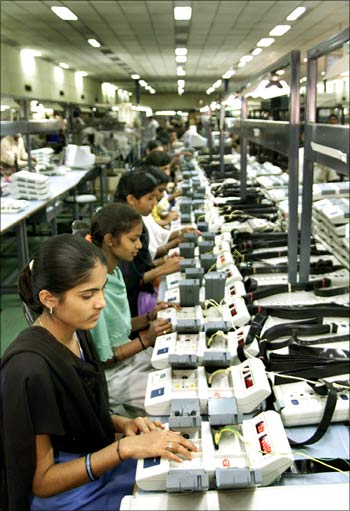
The global job scene has steadied somewhat. Here's what to consider before taking the plunge.
A job abroad brings with it a notion of higher salaries and better lifestyles. However, post-downturn, the realities of the global job space have undergone a significant change.
The global jobs scenario
The worldwide employment scene has been following a definite trend. While the jobs' graph saw a sharp decline till the end of 2008, it flattened out during the first half of 2009. It's only since the later half of last year that it started looking better. However, the growth has been slow and nowhere near pre-downturn levels. The first half of 2010 is thus likely to be a period of consolidation.
Europe and the United States have survived the worst of the crisis and are showing signs of improvement. For the Middle East too, things have become better. . . .

"However, after the Dubai crisis, employers are considering delaying hiring decisions by 3-6 months," says Vineet K Singh, business head, NaukriGulf.com, Naukri's Middle East portal. Another major destination that is hiring is Africa. To get a snapshot of the destinations and sectors that are hiring see A Map of the World below.
A Map Of The World
| Destinations | Job Opportunities | Ground Facts |
| United States | Environmental engineering, biotechnology, healthcare, software, information technology, network system analysis, financial services, construction and manufacturing | Getting a job is tough, though not impossible with H-1B restrictions being tightened. Hiring in small numbers for highly qualified professionals for niche and domain specific skills. |
| Europe (UK, Germany, East European countries, France) | Legal services, public sector, defence, insurance, real estate, banking, healthcare | Similar situation as in the US. With the new point based immigration system putting a higher weightage to skills and earning potential, getting a work permit is tougher. |
| Africa ( South Africa, Sudan, Kenya, Nigeria, Egypt, Ghana, Uganda) | Oil and gas, construction, cement, manufacturing, hospitality, telecom, FMCG and mining. Civil and mechanical engineering, CAs, management level professionals are in demand | Like the rest of the world this region has not been immune to the downturn. Things have improved but hiring numbers are less. Situation expected to improve in 2010. Countries like Nigeria and Kenya are politically disturbed. |
| Middle East ( Qatar, Oman, Saudi Arabia, Libya) | Oil and gas, energy, construction, real estate, financial services, healthcare, hospitality and retail. Generic functions like HR, sales and accounts are also in demand. | The situation has improved since same quarter last year, but things are not as good as pre-downturn levels. Things have slowed down a bit after the Dubai crisis with employers postponing hiring decisions by 3-6 months. |
. . .

Why work abroad?
A combination of several factors could influence a person's decision to explore a career abroad. One big factor is a pure economic benefit from higher compensation or zero taxes (as in the Middle East).
People also look for a global exposure as a significant addition to their curriculum vitae. This applies in particular to the US or European markets that have 'higher benchmarking processes' and 'helps in upgrading the skills' of an individual, as Sunil Goel, director, GlobalHunt India, an executive search firm, puts it.
However, over the years, the appeal for global jobs has declined. In fact, with India being one of the few countries growing at over 6 per cent, it is likely to offer you a faster growing career than other countries.
The salary gap between India and countries abroad has also narrowed considerably, especially for middle and senior management positions. It pays to look for a job back home, unless you get a really good offer abroad. . . .

Search for a job abroad
Overseas consultants and recruitment firms are good channels to start your overseas job search. But be sure to verify their credibility.
Sandeep Garg, immigration and international HR consultant with Overseas Career, an international career consultant, says, "Check whether the consultant is registered and has the license from the ministry of overseas Indian affairs to recruit for international assignments."
Another way to search is through online job portals. Sanjay Modi, managing director, Monster.com, India, Middle East and South-East Asia has a word of advice.
"Individuals should concentrate on the organisation they are working for. If the organisation has got a good track record, uses the latest technology and offers a good salary and career growth, one can take up a job even in a third world country." . . .

Things to consider
First, analyse what it means in terms of growth, career prospects and opportunities. "You also have to remember that opting for an overseas job is not only a change in your professional life, but also a change in your culture, environment and geography. So, while selecting, be clear what your interests and expectations from yourself are," says Goel.
Decide whether you want to shift with your family, as it could affect your spouse's career and your children's education.
A higher salary might not translate into a higher savings potential if the taxes or the cost of living are high.
"Hidden costs need to be factored," says Kapil Gupta, CEO, Shella Consultants, a firm that specialises in international recruitments. "Free accommodation could exclude cost of utility bills. Commuting costs also need to be factored in if company is not providing transport," he says. The political situation needs to be considered too. . . .

Do your homework
Right from when you start searching, to when you get the job and leave the country, doing the due-diligence is crucial (see Checklist). The general rule is "If it is too good to be true, it probably is". Be wary of abnormally high salaries or improper selection criteria.
The world is your workplace. Grab the opportunity.
Checklist